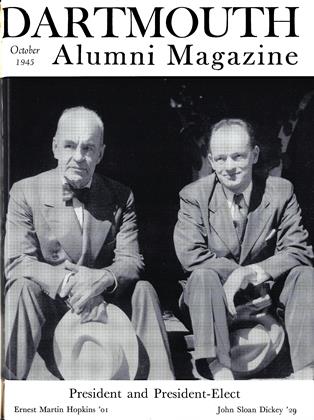When Dartmouth college changes pilots it is a matter of prime interest to all New England. For reasons that are many and varied and extend back a century or more Dartmouth holds a unique position among New England colleges and universities. It seems to have placed and kept its roots closer to the life-giving soil for one thing. It has drawn to its classrooms and produced from them men who bear a distinctive stamp and a very worthwhile stamp, too. In recent decades there has been a deliberate effort to broaden the source of supply. But the result seems to be pretty much as of old. The Dartmouth type is still a typeand a darned good one.
As for President Ernest M. Hopkins, whose choice to head the Hanover institution 89 years ago at the age of 38, was like a .bucket of ice water tossed in the face of New England college traditions, it may be well said of him that he brought bigness and maturity to a college that had basked almost too long in the sunlight of the distinction given it by its most famous alumnus, Daniel Webster, in arguing the Dartmouth college case in the Supreme Court as "a small college, and yet there are those who love it." One morning commentator says about all that need be said of the Hopkins era at Dartmouth when he writes: "He brought to Hanover a lively sense of inqum a wholesome restlessness, a bounding ambi. tion, a desire to have Dartmouth excel in any. thing it undertook, from football to education." He did all that. And he did something else that is bound to carry over into Dart mouth's future for many years. He kept alive among Dartmouth alumni an interest in its affairs, great and small, that is unique among American colleges and universities. It even extends to alumni pocketbooks. The annual reports of moneys showered down on Hanover from loyal sons of Dartmouth brings mist to the eyes of other institutions who do not benefit so largely on a per capita basis.
Dr. Hopkins came out of the business world to become a great figure among American educators of his time. Incidentally he never lost his touch with the business world and is today a director in a number of large corporation! where his advice is given full attention. The trustees have put the stamp of their approval on him and his record by selecting another youngster of 38, this one versed in the arts of government as well as those of the world ot business, to pick up his tossed torch.
 View Full Issue
View Full Issue
More From This Issue
-
 Article
ArticleHARRY L. HILLMAN
October 1945 By SIDNEY C HAZELTON '09, -
 Article
ArticleDARTMOUTH'S NEW LEADER
October 1945 -
 Article
ArticleLaureled Sons of Dartmouth
October 1945 By H. F. W. -
 Class Notes
Class Notes1918
October 1945 By ERNEST H. EARLEY, DONALD L. BARR -
 Class Notes
Class Notes1917
October 1945 By MOTT D. BROWN, DONALD BROOKS -
 Sports
SportsTHE FOOTBALL OUTLOOK
October 1945 By Francis E Merrill '26







